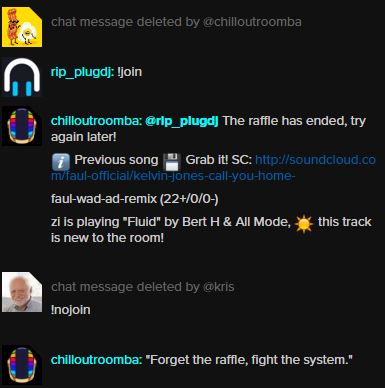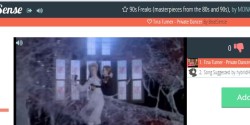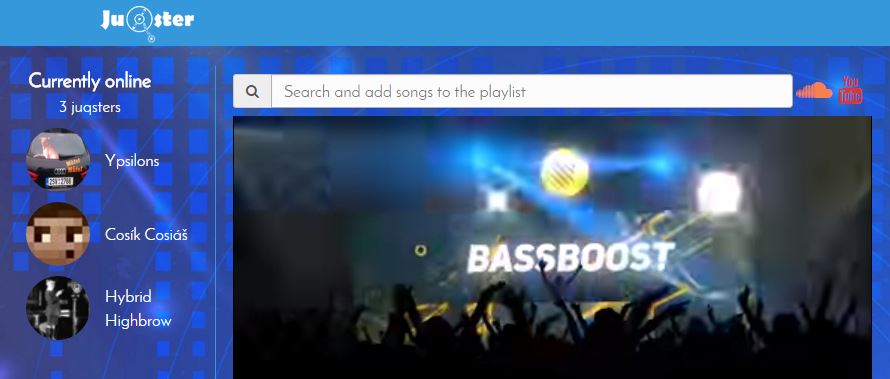Plug.dj is gone, but the idea of a service that offers virtual dj rooms to music sharers will not die. Four alternate turntable room style applications have become more prominent over the last six months: Dubtrack.fm, Juqster, Beatsense, and Soundtrack.io. Compared to plug.dj and its predecessor turntable.fm, they’re pretty bare bones. But maybe that’s the application/economic model that will survive this hypercompetitive interactive digital music sharing market.
“I was on both TT and Plug and they require more effort to be part of a room in any meaningful way,” one of our readers commented after plug.dj went down, “and since music listening is by and large passive they didn’t have the subscription numbers to support themselves.”
 Dubtrack.fm’s Facebook page says it has been around since May of 2012. It is less involved than plug.dj or turntable.fm. Forget about turntable rows, dancing avatars, and such. Still, the basics are there: you can create rooms, search for tunes via YouTube and SoundCloud, and manage your room participants by setting up rules and dj waiting lists. You can also chat with other dubtrackers. It amused me that the room that I gravitated to, the Chillout Room, included a participant who named himself rip_plugdj. Another chatter borrowed the turntable.fm superuser avatar (see graphic on left). It’s like there is this collective remembrance of earlier iconographies as turntable room lovers migrate from one service to another.
Dubtrack.fm’s Facebook page says it has been around since May of 2012. It is less involved than plug.dj or turntable.fm. Forget about turntable rows, dancing avatars, and such. Still, the basics are there: you can create rooms, search for tunes via YouTube and SoundCloud, and manage your room participants by setting up rules and dj waiting lists. You can also chat with other dubtrackers. It amused me that the room that I gravitated to, the Chillout Room, included a participant who named himself rip_plugdj. Another chatter borrowed the turntable.fm superuser avatar (see graphic on left). It’s like there is this collective remembrance of earlier iconographies as turntable room lovers migrate from one service to another.
Meanwhile Juqster says its name is an amalgam of “hipster” and “jukebox.” It offers the same SoundCloud/YouTube searchability as Dubtrack, but calls its rooms “hubs.” You can create your own hub or hang out in someone else’s. I did not see a whole lot of users in any given room when I visited Juqster on Saturday afternoon, but it was, after all, Saturday afternoon. Like Dubtrack and earlier services, it lets you log in via your Facebook or Twitter account.
As for Beatsense, I liked the “90sfreaks” room that I visited. “BeatRooms” include stats for the most popular songs and the most popular “Beatsters,” based on how many “upvotes” their chosen songs received. But as with Juqster, I did not see many very heavily populated rooms. I did like what happened when I tried to vote for my own song. “You can’t vote for your own song, silly,” the system responded.
Last, there is soundtrack.io, which defines itself as an open source “no-frills platform for listening to music with our friends.” The problem is that when I checked in on the service, I couldn’t find any friends. A home page participation script printout reported: “405 Rooms with 1 total listeners out of 1185 users.”
There are even more turntable sites allegedly coming around the bend. One of them is spinit.fm, which has a website but has not gone live yet. Another is turn.dj, whose progenitor tried to foster a discussion on Reddit last month about how he hopes to improve on the turntable concept. I found this response telling:
“Please, for the love of everything, just have a sensible business model. I won’t pretend like I know how this sort of business works, so I hope you have some good ideas. As said in the main post, a few avatars, a fancy name and the ability to post pictures in the chat just don’t give enough incentive for people to subscribe. I wouldn’t be opposed to the idea of prioritizing subscribers in the wait list or limiting non-paying users to play a song only ever so often, possibly even adding a restriction that non-paying room hosts can only have up to X visitors and their rooms cannot be private. If it’s necessary to keep you out of the reds, then there’s no argument against it.”
I’m starting to wonder whether there is any “sensible business model” for this format. Clearly the code is out there and available for modification and repurposing, but generating positive revenue from the framework seems much more daunting. Maybe this is something that needs to be offered by sectors of our culture less focused on the bottom line. The city of Denver, Colorado, for example, has a streaming channel specializing in local bands, delivered by the city’s public library. Any thoughts on other possibilities ? . . . .





